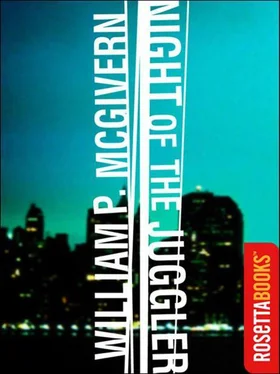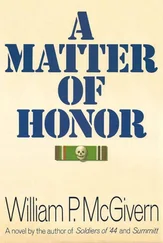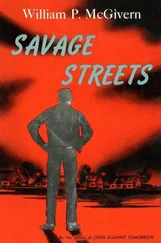William McGivern - Night of the Juggler
Здесь есть возможность читать онлайн «William McGivern - Night of the Juggler» весь текст электронной книги совершенно бесплатно (целиком полную версию без сокращений). В некоторых случаях можно слушать аудио, скачать через торрент в формате fb2 и присутствует краткое содержание. Жанр: Триллер, на английском языке. Описание произведения, (предисловие) а так же отзывы посетителей доступны на портале библиотеки ЛибКат.
- Название:Night of the Juggler
- Автор:
- Жанр:
- Год:неизвестен
- ISBN:нет данных
- Рейтинг книги:3 / 5. Голосов: 1
-
Избранное:Добавить в избранное
- Отзывы:
-
Ваша оценка:
- 60
- 1
- 2
- 3
- 4
- 5
Night of the Juggler: краткое содержание, описание и аннотация
Предлагаем к чтению аннотацию, описание, краткое содержание или предисловие (зависит от того, что написал сам автор книги «Night of the Juggler»). Если вы не нашли необходимую информацию о книге — напишите в комментариях, мы постараемся отыскать её.
Night of the Juggler — читать онлайн бесплатно полную книгу (весь текст) целиком
Ниже представлен текст книги, разбитый по страницам. Система сохранения места последней прочитанной страницы, позволяет с удобством читать онлайн бесплатно книгу «Night of the Juggler», без необходимости каждый раз заново искать на чём Вы остановились. Поставьте закладку, и сможете в любой момент перейти на страницу, на которой закончили чтение.
Интервал:
Закладка:
“All right,” Luther Boyd said. “Then we’ll have our talk. But remember the ground rules, Kate. Make sure Mr. Brennan is on the sidewalk where he can see you, and stay on this side of the avenue.”
Kate untangled herself from his arms and lap and walked to the door, where she stopped with her back toward him, a suggestion of tension in her little shoulders. She looked back at her father, and he realized from the sad maturity in her expression that she had guessed at the core of the abrasive estrangement between himself and Barbara.
“Does she blame you because Buddy got killed?”
He had no ready answer for this question, and feeling helpless, he stared in silence at the backs of his big, powerful hands. Then he glanced about the room as if seeking some escape from Kate’s troubled eyes, noting irrelevantly how the last of the daylight had coated the surfaces of the furniture and carpeting with a fine veneer of rose and lemon reflections. At last Luther Boyd did the thing he feared to do (which was something his father had always commanded him to do without hesitation), and that was simply to turn away from the familiar, sustaining volumes of his military library and to look steadily into his young daughter’s troubled and faintly accusing eyes. “Yes, it’s got something to do with Buddy’s death,” he said.
“But it wasn’t your fault that Buddy got killed.”
“I’ll try to explain it to you, although I’m not sure I can,” he said.
“But it wasn’t your fault,” she said, and there was a tone of stubborn loyalty in her voice. “How could it be?”
“That’s one of the questions I’m not sure I can answer,” he said wearily.
After she had gone off with her Scottie, Luther Boyd stood and paced the floor restlessly, rubbing his jaw with the wedge formed by his thumb and forefinger. He tried not to think of Barbara. To distract himself, he thought of General Carmichael, whose problems at least presented a fair and reasonable challenge. One of the general’s most serious flaws stemmed from a paradoxical stylistic ingenuity; he was, in fact, an excellent persuasive writer, but this was a talent best served in the breach in the writing of military manuals. War was not a debate, with issues to be decided by closely reasoned arguments. The object was not to win on paper and lose in combat, or to study maps and ignore the battlefield. He took a volume at random from a shelf and flipped through the pages until he came to this quotation: “The enemy is badly beaten, greatly demoralized and exhausted of ammunition. The road to Vicksburg is open. All we want now are men, ammunition and hard bread. . ”
That was the kind of writing soldiers understood, clear and unequivocal, General Grant to Sherman.
From another volume he read: “It is 132 miles to the Rhine from here, and if this army will attack with venom and desperate energy, it is more than probable that the war will end before we get to the Rhine. Therefore, when we attack, we go like hell.” General Patton to the 95th Division in October, 1944.
And from yet another volume he read wise words from a statesman who was not only a military but a political strategist: “The problems of victory are more agreeable than the problems of defeat, but they are no less difficult.” That was the British bulldog with the cigar, Sir Winston Churchill.
But as he replaced the volume on the shelf, Luther Boyd realized he was committing a mistake which he would not permit in any officer in his command; he was postponing the decision of what and how much to tell his daughter, Kate, and that was an unforgivable and cowardly indulgence.
John “Buddy” Boyd had been Barbara Boyd’s son by a first marriage to a man who had been killed in an automobile accident on the New Jersey Turnpike when Buddy (then Buddy Shaw) had been four years of age. When Luther Boyd married Barbara Shaw, he had adopted Buddy, and when the boy was old enough to discuss the matter, they had mutually agreed to change his name legally from Shaw to Boyd.
Luther Boyd had loved Buddy as he would have a natural son and had gloried in his triumphs and suffered with his defeats, caring for him as wisely and completely as he cared for their daughter, Kate.
Buddy Boyd had enlisted in the Army four years before, despite a perforated eardrum, which would have automatically exempted him from service, and despite a high draft number, which mathematically excluded him from any chance of conscription.
But Buddy Boyd had ignored his mother’s injunctions to stay in college and had died unspectacularly but with great finality in a two-truck collision during his boot training at Fort Riley, Kansas. At first, Barbara had been a rock of determination and strength. She had packed off Buddy’s clothes and cameras and butterfly collections to Army hospitals, and she had converted his two rooms, which were directly above Luther Boyd’s library, into a ballet suite for Kate and her friends, complete with mirrors and bars and Degas prints. But after the first year, something insidious and virulent eroded her resolution and confidence.
She began to question her son’s death and then her husband’s life. She questioned his decisions, his values, his code of honor, which was the very core of Luther Boyd’s existence. She had come to believe that Boyd’s feverish preoccupation (her phrase) with weapons and falconry and hunting and killing had created an atmosphere that was like a stench of death in their home, and in this noisome air her son had sickened and died. How could the son of Colonel Luther Boyd decide not to go to war? Hating it, despising it, fearing it, loathing the guns and the killing. Buddy had nonetheless embraced it with his young life rather than risk Colonel Luther Boyd’s disapproval.
It wasn’t that way, Boyd thought bitterly. He simply was what he was, and there was no way to change that. Barbara could change, but he couldn’t. She could slip into the oblivion of drinks at dusk, she could exercise her grief in these spasms of neurotic indulgence, but there were no such anodynes or escape for Colonel Luther Boyd. He had been bred to take it, to clamp his teeth against any cry of pain or loss, leaving the possibly annealing tears to women and children and cowards.
The front doorbell echoed through the silent apartment. Luther Boyd walked through the corridor and living room and opened the door. Mr. Brennan, the uniformed lobby attendant, stood in the outer hallway.
Behind him the elevator doors were open.
“This just came in special delivery, Mr. Boyd,” Mr. Brennan said, handing Boyd a neatly wrapped package about the size of a deck of playing cards. Luther Boyd took the package but didn’t glance at it; his eyes were fixed hard and straight at Mr. Brennan.
“Did Kate go outside with Harry Lauder?”
“You’d better believe she didn’t, Mr. Boyd,” Mr. Brennan said. “She’s waiting right in the lobby for me to come down and keep an eye on her.”
As a young man Mr. Brennan had been a welterweight contender with the ring name of Kid Irish, and at sixty-four he was still in excellent physical condition and would have dearly relished the opportunity to deck any bastard who’d lay a finger on Kate Boyd.
“Well, fine,” Luther Boyd said. “And thanks.”
He closed the door and unwrapped the package. His fingers were a bit clumsy because he recognized Barbara’s handwriting on the heavy brown paper. The package contained a slim cartridge of electronic tape and a note from Barbara.
The note read:
I can’t ever explain anything to you, because I know you’re waiting for me to finish so you can point out in your logical, precise manner how wrong I am. But you do deserve an explanation. And so does poor, dear Kate. I’ve put down some of my feelings on this tape. Whether they “explain” anything, I’m not sure. But please believe that I have tried to be honest.
Читать дальшеИнтервал:
Закладка:
Похожие книги на «Night of the Juggler»
Представляем Вашему вниманию похожие книги на «Night of the Juggler» списком для выбора. Мы отобрали схожую по названию и смыслу литературу в надежде предоставить читателям больше вариантов отыскать новые, интересные, ещё непрочитанные произведения.
Обсуждение, отзывы о книге «Night of the Juggler» и просто собственные мнения читателей. Оставьте ваши комментарии, напишите, что Вы думаете о произведении, его смысле или главных героях. Укажите что конкретно понравилось, а что нет, и почему Вы так считаете.












